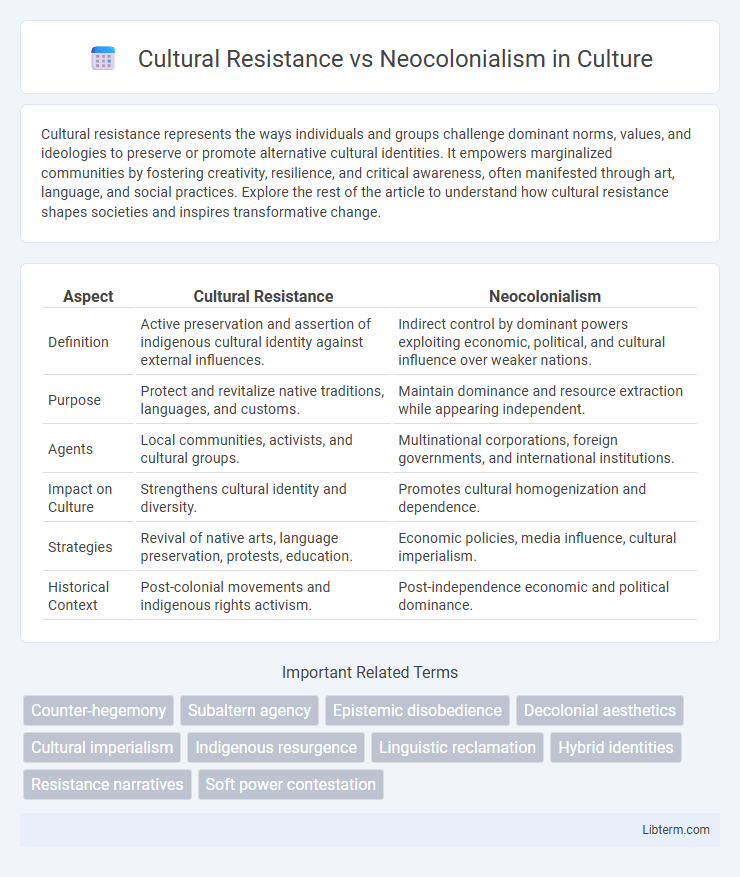Cultural resistance represents the ways individuals and groups challenge dominant norms, values, and ideologies to preserve or promote alternative cultural identities. It empowers marginalized communities by fostering creativity, resilience, and critical awareness, often manifested through art, language, and social practices. Explore the rest of the article to understand how cultural resistance shapes societies and inspires transformative change.
Table of Comparison
| Aspect | Cultural Resistance | Neocolonialism |
|---|---|---|
| Definition | Active preservation and assertion of indigenous cultural identity against external influences. | Indirect control by dominant powers exploiting economic, political, and cultural influence over weaker nations. |
| Purpose | Protect and revitalize native traditions, languages, and customs. | Maintain dominance and resource extraction while appearing independent. |
| Agents | Local communities, activists, and cultural groups. | Multinational corporations, foreign governments, and international institutions. |
| Impact on Culture | Strengthens cultural identity and diversity. | Promotes cultural homogenization and dependence. |
| Strategies | Revival of native arts, language preservation, protests, education. | Economic policies, media influence, cultural imperialism. |
| Historical Context | Post-colonial movements and indigenous rights activism. | Post-independence economic and political dominance. |
Understanding Cultural Resistance
Cultural resistance embodies the deliberate efforts by marginalized communities to preserve their indigenous identities, languages, and traditions in the face of neocolonial domination and cultural homogenization. It challenges systemic impositions by promoting local narratives, artistic expression, and alternative knowledge systems that counteract the erasure imposed by foreign economic and political influences. Understanding cultural resistance requires recognizing its role in empowering subaltern groups to reclaim agency and foster social cohesion against the pervasive reach of neocolonial power structures.
Defining Neocolonialism
Neocolonialism refers to the indirect control or influence exerted by powerful countries over developing nations through economic, political, and cultural pressures rather than direct military or political rule. It perpetuates dependency, undermining sovereignty by exploiting resources, controlling markets, and shaping policies to benefit former colonial powers and multinational corporations. This modern form of domination often manifests through global financial institutions, trade agreements, and media, restricting genuine development and reinforcing postcolonial inequalities.
Historical Roots of Neocolonial Influence
Neocolonialism traces its historical roots to the economic and political dominance exerted by former colonial powers post-World War II, securing control through multinational corporations and international financial institutions. Cultural resistance emerges as a powerful response, emphasizing the reclamation of indigenous identities, languages, and traditions suppressed during and after colonization. This resistance challenges neocolonial influence by fostering local agency and undermining the cultural imperialism embedded in global capitalist systems.
Mechanisms of Cultural Resistance
Mechanisms of cultural resistance against neocolonialism include reclaiming indigenous languages, revitalizing traditional art forms, and embedding local knowledge in education systems to counteract cultural homogenization. Grassroots movements and community storytelling serve crucial roles in preserving identity and challenging imposed narratives by neocolonial powers. These active efforts disrupt cultural dominance, fostering autonomy and empowering marginalized groups to resist economic and political exploitation.
Neocolonialism in Modern Globalization
Neocolonialism in modern globalization manifests through economic dependence, cultural dominance, and political influence exerted by powerful nations over developing countries. Multinational corporations and international financial institutions often shape domestic policies, perpetuating unequal power dynamics reminiscent of colonial control. This ongoing exploitation challenges the sovereignty and development of formerly colonized nations, embedding systemic inequalities within global trade and cultural exchanges.
The Role of Indigenous Movements
Indigenous movements play a crucial role in cultural resistance by reclaiming traditional knowledge, languages, and practices threatened by neocolonial forces. These movements challenge the imposed economic and political systems that perpetuate cultural erasure and exploit natural resources in indigenous territories. By asserting sovereignty and autonomy, indigenous groups actively dismantle neocolonial structures and promote sustainable, self-determined futures.
Media as a Tool for Resistance
Media serves as a powerful tool for cultural resistance by amplifying indigenous voices and countering neocolonial narratives that dominate mainstream discourse. Independent media platforms, community radio, and digital storytelling empower marginalized communities to reclaim cultural identity and challenge the pervasive influence of neocolonial media conglomerates. Through strategic use of social media and alternative news outlets, these groups disseminate counter-hegemonic content that fosters social awareness and mobilizes collective action against cultural imperialism.
Education and Preservation of Cultural Identity
Cultural resistance in education actively counters neocolonialism by prioritizing indigenous knowledge systems and languages, thereby preserving cultural identity amid globalizing influences. Educational frameworks integrating local history and traditions empower communities to maintain sovereignty over their cultural narratives, challenging dominant Western paradigms. This preservation of cultural identity through education serves as a vital tool against the homogenizing effects of neocolonial economic and political pressures.
Case Studies: Successful Cultural Pushbacks
Case studies of cultural resistance against neocolonialism reveal successful preservation of indigenous languages and traditions in regions like Latin America and Africa, where communities reassert cultural sovereignty through education and art. Initiatives such as the Zapatista movement in Mexico and the Maasai's defense of land rights demonstrate effective strategies to combat cultural erosion imposed by multinational corporations and foreign governments. These examples illustrate how cultural identity serves as a powerful tool to challenge economic and political domination in a neocolonial context.
The Future of Cultural Sovereignty
Cultural resistance challenges neocolonialism by preserving indigenous languages, traditions, and identity against external economic and political pressures. Maintaining cultural sovereignty involves reclaiming narrative control and promoting local knowledge systems in education and media. The future of cultural sovereignty depends on empowering communities through digital platforms and policy reforms that prioritize cultural diversity and self-determination.
Cultural Resistance Infographic

 libterm.com
libterm.com